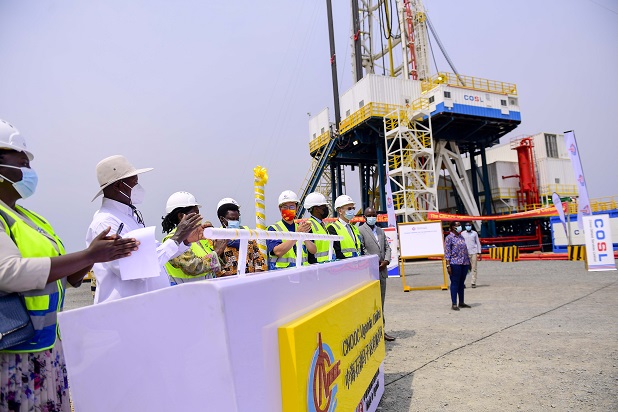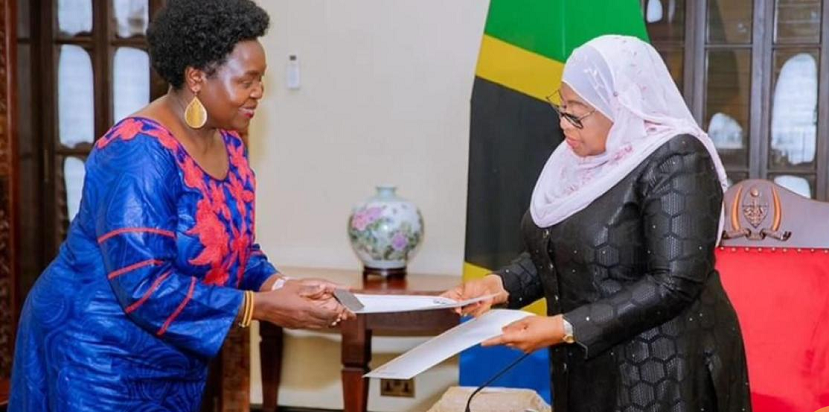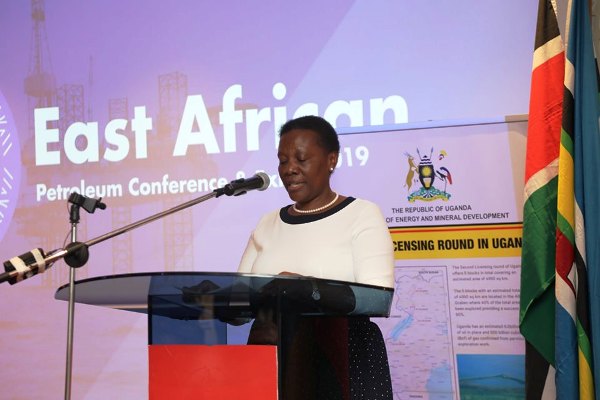President Museveni launched the commencement of drilling of the oil wells for the Kingfisher oil field
Uganda’s oil industry registered another key milestone on January 24, 2022, with the launch of the spudding (commencement of drilling of the oil wells) for the Kingfisher oil field. CNOOC Uganda Limited operates the Kingfisher field on behalf of the Joint Venture Partners TotalEnergies E&P and Uganda National Oil Company (UNOC).
The spudding ceremony was graced by Uganda’s President, H.E. Yoweri Museveni, who used the opportunity to reassure the world of the country’s resolve to exploit its oil and gas resources sustainably. The President recapped how the patience of his NRM Government to develop the resources had led to this, among other key milestones.
“I was approached by the Dutch company Shell VP to give them the go-ahead to look for this oil, but I hesitated after finding out we did not have any Ugandan experts on oil. This should be a lesson to all leaders to avoid bumping into issues of Africa.” The President said.
President Museveni also hailed the Chinese and French Governments for the continued support offered to Uganda to develop her resources. He said he was not amused by the European Parliament (EU) resolution that called for halting Uganda’s oil project.
He also urged locals in the Albertine region to embrace agriculture, which he says is the secure direct way of benefiting from the oil and gas resources being developed in the country.
“All people working in oil need food. Grow enough food, so they buy it from you,” said the President.
Ms Ruth Nankabirwa, the Minister of Energy and Mineral Development (MEMD), revealed that the country has embarked on an ambitious process of encouraging more exploration to discover more resources to take advantage of the new infrastructure being put in place.
“Government announced the Second Licensing Round in May 2019 with five blocks on offer. The Cabinet this month approved the issuance of Production Sharing Agreements for two of the blocks, Turaco and Kasuruban Blocks and grant of their respective Exploration Licenses,” revealed Ms Nankabirwa.
The Minister also used the event to issue the East African Crude Oil Pipeline (EACOP) construction licence to EACOP Limited, which Mr Martin Tiffen, the company’s managing director, received on behalf of the partners.
“The company applied for a license in July 2022 to construct the pipeline. We reviewed the application, held several discussions, found it satisfactory, and subsequently sought approval from the Cabinet for the grant of license. Last week, the government approved the issuance of the license,” Minister Nankabirwa remarked.
The license grants EACOP Ltd a go-ahead to start construction works in Uganda as part of the development of the 1,443km crude oil pipeline that will transport Uganda’s oil from Kabaale terminal, Hoima in Uganda, to the port of Tanga in Tanzania.
In his brief to the President, Mr Ernest Rubondo, the Executive Director of the Petroleum Authority of Uganda, revealed that the Kingfisher oil field is about 15km long and 3km wide and is about 2km below Lake Albert. The oil field is estimated to have a total of 560 million barrels of oil in place, out of which 190 million (33%) are expected to be produced over 20-25 years.
“The oil field is expected to have a maximum production of 40,000 barrels of oil per day for five years, after which production will begin to decline,” Mr Rubondo said.
He further said investment in the development of the Kingfisher oilfield is expected to cost over US$2 billion over the next three years, until shortly after production starts and over US$1.5 billion over the remaining 20 years of the life of the oil field.
“US$346 million was invested in the Kingfisher project in 2022, bringing the total cumulative investment in the project to US$ 1.07 billion at the end of 2022. About $580 million is expected to be invested in KFDA (Kingfisher Development Area) in 2023 and a similar amount in 2024,” Mr Rubondo revealed.
Mr Rubondo also said the Authority is implementing a Real-Time Monitoring Centre (RTMC). This facility, designed to receive and relay information from all the activities in the oil and gas sector in real-time, will be in place before the end of 2024.
Ms Irene Batebe, the Permanent Secretary at the MEMD, said the government’s commercialisation plan provides in-country value addition through refining, where they plan to develop a 60,000 barrels per day oil refinery.
“Alongside the refinery, the government, through UNOC, is developing the Kabaale petro-based industrial park in Hoima,” Ms Batebe said.
During the Annual Press Brief on the Oil and Gas held on January 20, 2023, the Minister revealed that the Final Investment Decision (FID) for the Refinery Project is expected by June this year.
Mr Chen Zhuobiao, the CNOOC Uganda Ltd Vice President, said his company would begin drilling the development and production wells using the state-of-the-art LR8001 Drilling Rig.
“The deluxe rig is expected to drill up to 8000m deep while providing maximum efficiency with minimal environmental impact,” Mr Zhuobiao said.
He added, “the equipment shall also provide more job opportunities for Ugandans during the well drilling and completion process, train more localised talents for oilfield development and bring tangible changes to local communities.”
The LR8001 Rig will be used to drill all the planned 31 production wells of this oil field. Twenty of these wells will be used to produce oil, while 11 will be used to inject water into the reservoir to help improve production.
The waste generated from the kingfisher project will be managed by a consortium of a Ugandan company, Luwero Industries Limited (a subsidiary of NEC) and an international firm, BHP, from China.
Mr Rubondo re-echoed his Authority’s commitment to ensuring sustainability and responsible project development of Uganda’s oil and gas projects.
“The PAU is working with the National Environment Management Authority and other agencies to ensure the strictest environmental and safety practices and technology in the planning, execution and decommissioning of the oil and gas projects in Uganda, including at this Kingfisher project,” stressed Mr Rubondo.
The Kingfisher project currently employs over 1500 people, and of these, 1,300 are Ugandans, and about 500 are from the communities surrounding the project.
Uganda expects to start commercial production in 2025 following the announcement of the Final Investment Decision in February 2022.





